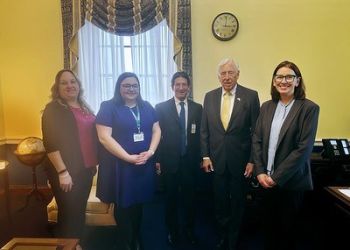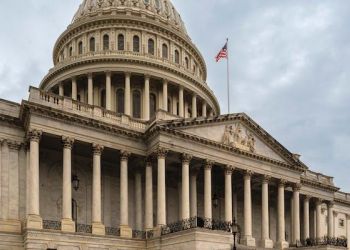In April, Data: Elemental to Health – a coalition of public health groups including NACCHO, Council of State and Territorial Epidemiologists (CSTE), Big Cities Health Coalition (BCHC), Association of Public Health Laboratories (APHL) and others – in partnership with the Centers for Disease Control and Prevention (CDC) held two congressional briefings on the importance of investing in data modernization. Local health officials and NACCHO members were featured as panelists for both briefings.
The first briefing, “CDC Data Modernization: The Future of Public Health Data and Analytics,” focused on the importance of investment in CDC’s Data Modernization Initiative (DMI) and public health data systems. Dr. Angela Dunn, NACCHO member and Executive Director for the Salt Lake County Health Department, participated as a panelist. Other panelists were:
- Megan Crumpler, PhD, Director, Orange County Public Health Laboratory
- Shawna Webster, Executive Director, National Association for Public Health Statistics and Information Systems
- Dan Jernigan, MD, MPH, CDC Deputy Director for Public Health Science and Surveillance
- Valerie Rogers, MPH, Director of Government Relations, HIMSS
House Appropriations Labor, Health & Human Services (LHHS) and Education Subcommittee Chair Rosa DeLauro (D-CT) delivered opening remarks stating the importance of investing in and updating public health data systems to better respond to future public health emergencies. She then handed the conversation over to Dr. Dunn who began her presentation stressing the importance of moving from outdated, burdensome data collection methods to new, innovative data systems. Dr. Dunn highlighted the coalition’s Call to Congress, asking for a sustained five-year federal investment of $7.84 billion to improve the key pillars of data modernization:
- Electronic case reporting (ECR), a system for identifying populations most at risk for disease and burden) including technological and workforce investments to enable enhanced interoperability;
- Lab information management systems (LIMS), the backbone for laboratory data collection, analysis, management and sharing;
- Syndromic surveillance, the collection of real time data used to continually monitor community health;
- Electronic vital records systems, state data reporting; and
- National notifiable disease surveillance systems, the collection and analysis of data from state, territorial, local and tribal public health agencies.
In her presentation, Dr. Dunn also spoke to the need for a state and local workforce capable of supporting these public health efforts, a focus of NACCHO’s 2022 Federal Legislative and Policy Agenda.
Representing public health laboratories, Dr. Crumpler emphasized that lab information and management systems are the backbone of laboratory data analysis, management, and sharing. Dr. Crumpler stressed the need for improved patient care through results in real time and explained that current systems are not properly placed to extrapolate data well.
Ms. Webster continued the conversation, explaining the system-wide transformation that has occurred in state-run vital records management, from paper-based to digital. She explained how complex electronic systems interact with state and federal public health agencies, providing the example of reliable mortality data that was reported during the national pandemic. To increase interoperability and real-time surveillance, Ms. Webster asked for additional funding to replace outdated technology within each jurisdiction.
Dr. Jernigan emphasized the need to move away from siloed data systems so that the public health system can have better, faster, more actionable intelligence that is available to the maximum number of people. He listed the benefits of modern data systems, explaining how they decrease the burden on hospital systems, free up staff, and inform disease forecasting.
Speaking on health care informatics, Ms. Rogers highlighted the goals of governmental public health data modernization, looking specifically at what improvements can be made to technological infrastructure. Her presentation focused on digitization, standardization, and innovation in digital health systems to increase the exchange of information during a crisis. All speakers echoed her wish for total system transformation, with expanded use of coordinated multi-modal data systems that help manage inequities and disparities.
All speakers acknowledged the successes of interoperable data systems during the COVID-19 pandemic. Both Dr. Dunn and Dr. Crumpler explained how even basic data systems greatly increased the ability of public health entities to respond during the crisis. To address the five pillars of data modernization, all panelists echoed the need for enhanced DMI funding and an increased focus on addressing public health workforce shortages. Panelists also called for sustained funding for local, state, territorial, and tribal public health systems to build up public health infrastructure. Dr. Webster ended the discussion with a call for increased attention to data modernization, saying that digital health systems cannot continue to successfully operate without large-scale data transformation. NACCHO has worked in coalition with public health groups to call for sustained investments in data modernization and public health data systems. You can view the full briefing here.
The second briefing, “Better Data, Better Analytics, Better Response,” examined how data modeling and analytics through the newly established CDC Center for Forecasting and Outbreak Analytics (CFA) can support outbreak response at the state and local level. Panelists for the briefing were:
- Dr. Jeff Duchin, Health Officer for Seattle-King County and NACCHO member
- Dr. Anne Zink, Chief Medical Officer for the State of Alaska
- Dylan George, PhD, Director of Operations at CFA
Senate Health, Education, Labor, and Pensions (HELP) Committee Chair Patty Murray (D-WA) delivered opening remarks highlighting her work to establish the CFA through the American Rescue Plan Act and to strengthen it through the PREVENT Pandemics legislation she authored with HELP Committee Ranking Member Richard Burr (R-NC). Chair Murray said that the CFA will assist health departments to predict, inform, and innovate a public health response to disease outbreaks.
In his remarks, Dr. Duchin described the value of modeling to policymakers at the local level. He recounted how Seattle-King County worked with volunteers to model and forecast the impact of COVID-19 to help inform decisions around mitigation efforts, including when the county was responding to the first confirmed COVID-19 cases in the county. He discussed the importance of modeling not just for the COVID-19 pandemic, but also to predict and inform decisions in response to future public health emergencies including weather-related events.
Dr. Zink expressed hope that CFA will alleviate challenges faced at the state level during the COVID-19 outbreak response, particularly around case data, and described the CFA as a potential “National Weather Service for infectious diseases” that allows health officials to track and predict infectious disease spread.
Dr. George helped to moderate the discussion while also providing an introduction to the CFA. He highlighted the Center’s role in building capacity at the state and local level, and also the need to invest in research to innovate and improve forecasting capabilities.
The briefing concluded with an appropriations request from the Data: Elemental to Health Coalition for $250 million for CDC’s Data Modernization Initiative in FY2023. You can view the full briefing here.









